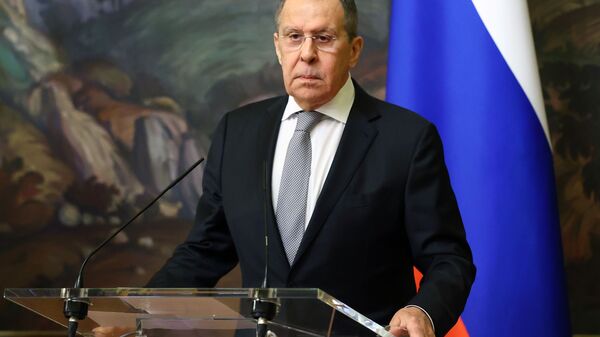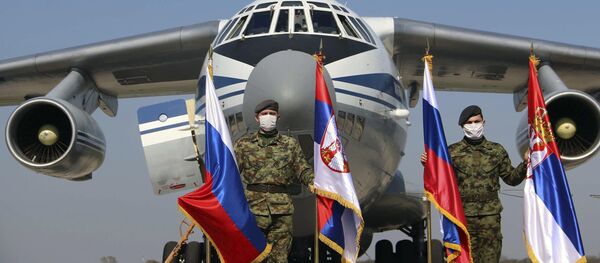"The most interesting thing is that no one can really explain what our so-called ‘harmful influence’ is. There are a lot of empty and idle arguments and insinuations, but no one can give evidence and facts," Lavrov said.
According to the minister, Russia's extensive multifaceted ties with all countries in the region are developing absolutely transparently, in full compliance with international law, and Moscow "also continues to play an important role in the post-conflict settlement."
"Obviously, someone does not like it, because it is an obstacle to the realization of the selfish interests of a number of international players who would like to turn this part of Europe into an arena of geopolitical confrontation and create new dividing lines there. Hence there are speculations about ‘harmful influence.’ Thus, these are not only clumsy efforts to denigrate Russia's policy in the Balkans that are seen, but also attempts to disguise own unsightly plans," Lavrov stated.
The diplomat noted that Russia sees the Western Balkans in the future as a "territory of security, stability, development and cooperation."
He described the Western Balkans as a unique region in terms of its geopolitical position, and historical and cultural features, and called the dialogue between its peoples and countries a guarantee of its prosperity. Russia, for its part, is ready to support any constructive initiative in the interest of peace and stability in the region, Lavrov added.
Russia, Bosnia and Herzegovina Interested in Boosting Bilateral Cooperation
The top Russian diplomat is visiting Bosnia and Herzegovina on Wednesday, where he is set to meet with the country’s political leadership. Lavrov plans to discuss bilateral ties and the situation in the Balkan region during his working trip.
Lavrov also told the Glas Srpske newspaper that Russian companies are interested in the industrial potential of Bosnia and Herzegovina’s Republika Srpska and are in talks to join its gas infrastructure development projects.
"It is no secret that a significant part of [Russia’s] practical cooperation with Bosnia and Herzegovina is [joint projects with] Republika Srpska. Our entrepreneurs are interested in the industrial potential of Republika Srpska. A possibility of Russian [companies] joining gas infrastructure development projects is being discussed," Lavrov said.
The minister noted that such cooperation "is not directed against anyone."
According to Lavrov, Russia has close historical and cultural ties with Republika Srpska and appreciates "the truly fraternal understanding that has been established between us."
"There is a deep mutual interest in boosting cooperation at all levels. I believe that the key success factor is the full compliance of the structure of our ties with the specifics of the Dayton agreement for Bosnia and Herzegovina. I would say that this is a confirmation of the efficiency and functionality envisioned by the peace agreement of the administrative system of Bosnia and Herzegovina. It is necessary to follow the established rules without trying to bypass them," Lavrov said, adding that Moscow and Sarajevo are interested in further boosting cooperation in all areas and plan to take necessary steps toward enhancing bilateral relations.
The 1995 Dayton agreement is a peace deal that put an end to the longstanding conflict in the Balkan country. Under the agreement, two autonomous entities within the country, Republika Srpska and the Federation of Bosnia and Herzegovina, were created.
"Of course, we plan to pay great attention to the Dayton agenda," Lavrov said.
Office of High Representative in Bosnia And Herzegovina Outdated, Needs Revision
The Office of the High Representative (OHR) in Bosnia and Herzegovina, which oversees the implementation of the 1995 Dayton Agreement, needs to be revised and is outdated, Russian Foreign Minister Sergei Lavrov said.
The OHR oversees the civilian implementation of the agreement. To date, all high representatives for Bosnia and Herzegovina were from the European Union member states, and the position is currently occupied by Austrian diplomat Valentin Inzko.
"What really needs to be revised is the existence of the Office of the High Representative. No one can dispute the fact that this mechanism of external control was supposed to be a purely temporary measure. In 2006, a decision was made to close it, but its implementation is constantly being postponed under various pretexts," Lavrov said.
The top Russian diplomat added that the OHR was not only outdated but also humiliating for Bosnia and Herzegovina, as the country did not need external "supervision."
"All responsibility for the future of the country belongs only to its people," the Russian minister said.
At the same time, Lavrov mentioned that there was no need to revise the Dayton agreement, amid calls "from abroad" to adopt changes to the peace accord. The top Russian diplomat said that such calls were due to provisions of the agreement going against the interests of some nations.
Russia, as one of the guarantors of the Dayton agreement, supports the observance of its principles and calls for all partners in Bosnia and Herzegovina and abroad to follow suit, Lavrov concluded.
According to the foreign minister, the Russia-Bosnia relationship can be described as a "friendly partnership."
"Thanks to our joint efforts, we managed to build a stable system of relations based on pragmatism, mutual respect, mutual understanding of a wide range of issues in a relatively short period of time. We do not have unsolved issues," Lavrov added.
The top diplomat also said that Moscow and Sarajevo support each other at multilateral platforms. In particular, Lavrov said that the two countries agree on the unacceptability of revising the results of World War II.





